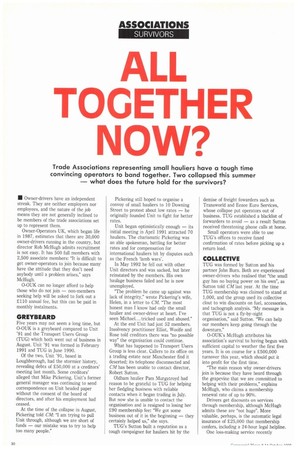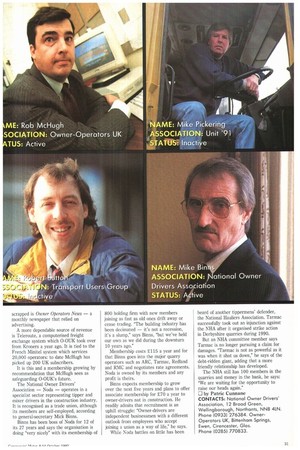ALL TOGETHER NOW?
Page 32

Page 33

If you've noticed an error in this article please click here to report it so we can fix it.
• Owner-drivers have an independent streak. They are neither employers nor employees, and the nature of the job means they are not generally inclined to be members of the trade associations set up to represent them.
Owner-Operators UK, which began life in 1987, estimates that there are 30,000 owner-drivers running in the country, but director Rob McHugh admits recruitment is not easy. It has 500 full members with 2,500 associate members: "It is difficult to get owner-operators to join because many have the attitude that they don't need anybody until a problem arises," says McHugh.
0-0UK can no longer afford to help those who do not join — non-members seeking help will be asked to fork out a £110 annual fee, but this can be paid in monthly instalments.
GREYBEARD
Five years may not seem a long time, but 0-0UK is a greybeard compared to Unit '91 and the Transport Users Group (TUG) which both went out of business in August. Unit '91 was formed in February 1991 and TUG in June 1990.
Of the two, Unit '91, based in Loughborough, had the stormier history, revealing debts of £50,000 at a creditors' meeting last month. Some creditors' alleged that Mike Pickering, Unit's former general manager was continuing to send correspondence on Unit headed paper without the consent of the board of directors, and after his employment had ceased.
At the time of the collapse in August, Pickering told CM: "I am trying to pull Unit through, although we are short of funds — our mistake was to try to help too many people."
Pickering still hoped to organise a convoy of small hauliers to 10 Downing Street to protest about low rates — he originally founded Unit to fight for better rates.
Unit began optimistically enough — its initial meeting in April 1991 attracted 70 hauliers. The charismatic Pickering was an able spokesman, battling for better rates and for compensation for international hauliers hit by disputes such as the French 'lamb wars'.
In May 1992 he fell out with other Unit directors and was sacked, but later reinstated by the members. His own haulage business failed and he is now unemployed.
"The problem he came up against was lack of integrity," wrote Pickering's wife, Helen, in a letter to CM. "The most honest man I know had only the small haulier and owner-driver at heart. I've seen Michael...tricked used and abused."
At the end Unit had just 52 members. Insolvency practitioner Elliot, Woolfe and Rose told creditors there was "no possible way" the organisation could continue.
What has happened to Transport Users Group is less clear. Callers to its office on a trading estate near Manchester find it deserted; its telephone disconnected and CM has been unable to contact director, Robert Sutton.
Oldham haulier Pam Murgatroyd had reason to be grateful to TUG for helping her fledgling business with reliable contacts when it began trading in July. But now she is unable to contact the organisation and is resigned to losing her £90 membership fee: 'We got some business out of it in the beginning — they certainly helped us," she says.
TUG's Sutton built a reputation as a tough campaigner for hauliers hit by the demise of freight fowarders such as Transworld and Eezee Euro Services, whose collapse put operators out of business. TUG established a blacklist of forwarders to avoid — as a result Sutton received threatening phone calls at home.
Small operators were able to use TUG's offices to receive faxed confirmation of rates before picking up a return load.
COLLECTIVE
TUG was formed by Sutton and his partner John Burn. Both are experienced owner-drivers who realised that "the small guy has no buying power on his own", as Sutton told CM last year. At the time TUG membership was claimed to stand at 1,000, and the group used its collective clout to win discounts on fuel, accessories, and tachograph analysis. "My message is that TUG is not a fly-by-night organisation," said Sutton. "We can help our members keep going through the downturn."
0-0UK's McHugh attributes his association's survival to having begun with sufficient capital to weather the first five years. It is on course for a £500,000 turnover this year, which should put it into profit for the first time.
"The main reason why owner-drivers join is because they have heard through the grapevine that we are committed to helping with their problems," explains McHugh, who claims a membership renewal rate of up to 90%.
Drivers get discounts on services through membership, although McHugh admits these are "not huge". More valuable, perhaps, is the automatic legal insurance of £25,000 that membership confers, including a 24-hour legal helpline.
One loss-making service recently
scrapped is Owner Operators News — a monthly newspaper that relied on advertising.
A more dependable source of revenue is Teleroute, a computerised freight exchange system which 0-0UK took over from Kroners a year ago. It is tied to the French Minitel system which services 20,000 operators: to date McHugh has picked up 200 UK subscribers.
It is this and a membership growing by recommendation that McHugh sees as safeguarding 0-0UK's future.
The National Owner Drivers' Association — Noda — operates in a specialist sector representing tipper and mixer drivers in the construction industry. It is recognised as a trade union, although its members are self-employed, according to general-secretary Mick Binns.
Binns has been boss of Noda for 12 of its 27 years and says the organisation is doing "very nicely" with its membership of 800 holding firm with new members joining as fast as old ones drift away or cease trading. "The building industry has been decimated — it's not a recession, its a slump," says Binns, "but we've held our own as we did during the downturn 10 years ago."
Membership costs 2115 a year and for that Binns goes into the major quarry operators such as ARC, Tarmac, Redland and RMC and negotiates rate agreements. Noda is owned by its members and any profit is theirs.
Binns expects membership to grow over the next five years and plans to offer associate membership for £70 a year to owner-drivers not in construction. He readily admits that recruitment is an uphill struggle: "Owner-drivers are independent businessmen with a different outlook from employees who accept joining a union as a way of life," he says.
While Nods battles on little has been heard of another tippermens' defender, the National Hauliers Association. Tarmac successfully took out an injunction against the NHA after it organised strike action in Derbyshire quarries during 1990.
But an NHA committee member says Tarmac is no longer pursuing a claim for damages. "Tarmac is not as powerful as it was when it shot us down," he says of the debt-ridden giant, adding that a more friendly relationship has developed.
The NHA still has 100 members in the quarries and money in the bank, he says: "We are waiting for the opportunity to raise our heads again."
El by Patric Cunnane
CONTACTS: National Owner Drivers' Association, 12 Broad Green, Wellingborough, Northants, NN8 4LN. Phone (0933) 276384. OwnerOperators UK, Bittenhom Springs, Ewen, Cirencester, Glos.
Phone (0285) 770833.




































































































